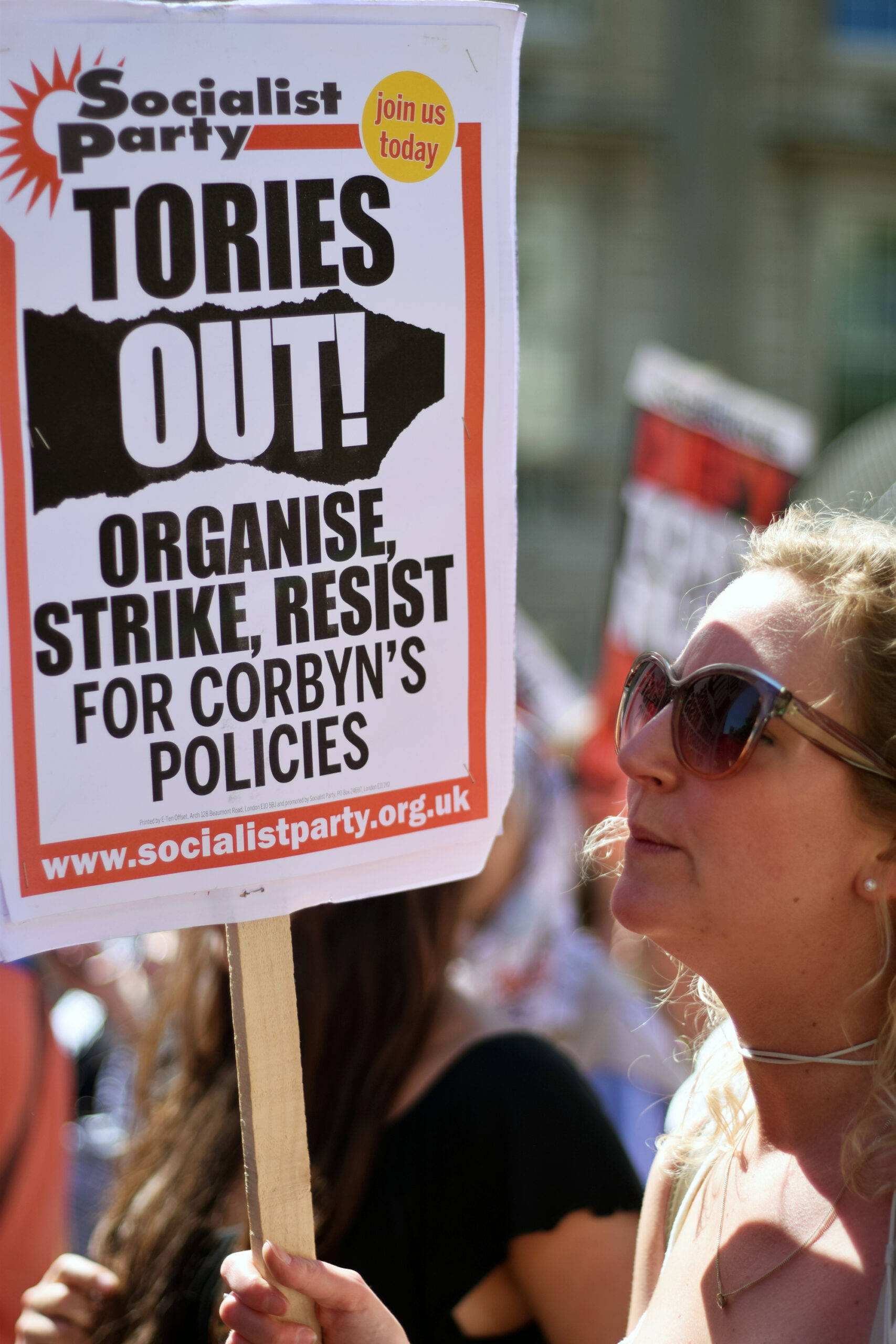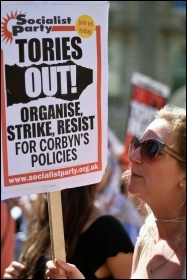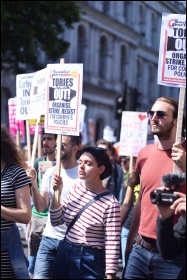May and Tories must go!
Organise, strike, resist, to fight for Corbyn’s policies
Hannah Sell, Socialist Party deputy general secretary
Theresa May’s failed election gamble is a nightmare for the capitalist class in Britain. Seven weeks ago most of Britain’s elite were hopeful that May would succeed in dramatically increasing the number of Tory MPs, thereby buttressing her government to be able to weather the storms of economic crisis, to carry out vicious austerity against the majority in society and to implement a Brexit in the interests of the 1%.
Instead she is now a ‘dead prime minister walking’, only able to temporarily cling to power by leaning on the reactionary, sectarian Democratic Unionist (DUP) MPs, describing them as her ‘friends’ on the steps of Downing Street.
The DUP, founded by Ian Paisley, are anti-abortion, anti-LGBT rights and deniers of climate change. However, it will not only be the Tories who are dirtied by this new ‘coalition of chaos’.
The DUP’s base is mainly among a section of the Northern Irish Protestant working class who are badly affected by Tory austerity.
It seems that the DUP have already demanded the dropping of May’s plans to abolish the winter fuel allowance for the majority of pensioners as a condition of co-operation.
Tories Out! There is no mandate for May
The Tories are split down the middle and now have a leader with no authority inside or outside the party.
She is only remaining in place because the Tories can find no other alternative for now, and fear falling apart if they attempt a leadership contest.
Jeremy Corbyn and John McDonnell have rightly called on May to resign and pledged to put their programme to parliament and challenge MPs to support it.
Now we need to build a movement for the implementation of their policies, whatever the parliamentary arithmetic.
The general election result was a complete vindication of Jeremy’s anti-austerity stance. On 18 April, the day the election was called, the Socialist Party declared that: “If Corbyn fights on a clear socialist programme – for a Brexit in the interests of the working and middle-class – he could win the general election.”
At the time that was met with derision by many including the right wing of the Labour Party: who wrongly thought a general election would give them the opportunity to unseat Corbyn.
Let’s not forget that just last September arch-Blairite Peter Mandelson told the press that he ‘prayed every day for a snap general election’ as it would mean the end of Corbyn’s leadership.
Corbyn strengthened
Instead this general election has enormously strengthened Jeremy Corbyn’s position in the Labour Party and potentially in society.
Labour got over 40% of the vote compared to just over 30% in 2015, the biggest increase in the vote share for any party since the Attlee government in 1945.
This was against the background of a phenomenal increase in the popular vote of 3.5 million, from 9.3 million in 2015, to 12.8 million this time.
This was almost entirely accounted for by the streams of young people that flooded to the polls. The very opposite of apathetic young people participated in a mass electoral revolt to demand a future.
Some estimates suggest that as many as 72% of young people on the electoral register voted, compared to 43% in 2015.
Two thirds of them voted for Corbyn. The Liberal Democrat’s hope of winning young, middle class voters by claiming to be the ‘true remainers’ largely fell flat.
Instead Nick Clegg finally got his just deserts for increasing tuition fees in 2010. Corbyn’s programme of a £10 an hour minimum wage, abolition of tuition fees, rent controls, and council house building inspired young people to take a stand.
The resulting politicisation of young people will not be reversed, and lays the basis for the development of mass support for socialist ideas.
The support for Corbyn among young people was widespread among both the working and middle class; demonstrated by Labour’s victory in Canterbury, which didn’t elect a Tory for the first time since 1918.
This reflects the increasing radicalisation of middle class young people who, as a result of low pay and astronomical housing costs, are increasingly being pushed down into working class living conditions.
It is wrong and scandalous, however, as some in the capitalist media have done, to paint this election as ‘young versus old’. This is a conscious attempt to divide the working class which both generations should consciously attempt to overcome by standing in solidarity with each other, whether over tuition fees or winter fuel allowance.
Many older workers, disillusioned with Blair’s Labour, put a cross next to a Labour candidate for the first time in decades in order to support Jeremy Corbyn.
In Wales, despite the Tories dreaming of gains at the start of the election, Labour made significant gains.
The UKIP vote also did not simply collapse into the Tories as May had hoped.
Among some who voted UKIP in 2015 (undoubtedly including some ex-Labour voters) May’s false posturing as being ‘tough on Brexit’ meant that they voted for her this time.
Had Jeremy Corbyn not made an early concession to the Blairites by reluctantly agreeing to campaign for ‘Remain’, and instead stuck to his own historic position (and that of the Socialist Party) of calling for exit from the EU bosses’ club, on an anti-racist, internationalist basis, May would never have been able to make the gains she did among working class voters.
Nonetheless, the position Jeremy Corbyn adopted during the election campaign – of explaining he would fight for a Brexit in the interests of working class people – was able to win over a section of workers including some who had previously voted UKIP.
Even Nigel Farage had to admit that Corbyn had ‘pulled off’ winning the support of both young ‘remainers’ and working class UKIP voters.
The fundamental reason that Jeremy Corbyn started the election campaign so far behind was that the majority of the population had not heard what he stood for.
Of course, this was partly because of the inevitable hostility of the big-business media, but that was – if anything – stepped up in the course of the election campaign, yet support for him soared.
The difference was that, instead of staying quiet in a vain attempt to appease the Blairites, the Corbyn wing of the party took their programme to the country. The right tacitly accepted this, hoping that Jeremy would then ‘own’ the defeat – instead he ‘owns’ the highest Labour vote since 1997.
This would have been even higher if Corbyn had earlier and more clearly stated he supported the right of self-determination for the people of Scotland, including a new independence referendum if they so wished.
As it was, increasing disillusionment with the SNP’s implementation of austerity in Scotland, meant that Corbyn was able to win increased votes in some working class Scottish heartlands, but it was far less than could have potentially been achieved.
At the same time the Tories made considerable gains in more affluent areas of Scotland, largely by mobilising a certain ‘anti-independence’ vote.
Trade union mobilisation needed
Jeremy Corbyn’s success now needs to be urgently built on. The trade union movement should call an immediate national ‘Tories Out’ demonstration against austerity – calling for the scrapping of the Tory attacks on the NHS and schools, for abolition of the anti-trade union laws, and for scrapping tuition fees.
The National Union of Students should also build for the demonstration around the question of fees.
Such a demonstration could be millions strong and the springboard for a 24 hour general strike. This in turn could force May to call a new general election.
At the same time Jeremy Corbyn and the Labour left should make a clear call for Labour councils to stop implementing Tory cuts.
In a short campaign very impressive numbers were convinced to vote for Corbyn despite their initial scepticism about whether he would implement his programme.
Nonetheless, the scepticism was still seen in the considerable numbers who didn’t vote. Turnout was up two points from 2015 but 31% of voters still stayed at home.
This scepticism is a result of the betrayals of New Labour in office, and the experience of Labour councils at local level that have presided over 40% cuts in services since 2010.
To consolidate the enthusiasm that was generated for Corbyn in the election it is necessary to now make clear that he opposes any more council cuts, and that this Tory government is too weak to force Labour councils to implement them.
This is particularly important in urban areas, where the surge to Corbyn was strongest, and where many councils in England have elections next year.
Transform the Labour Party
“Big up Jezza for reviving so many ppls hope in politics. If Labour was united behind Corbyn this past year he coulda won this outright!” said Riz Ahmed of the hip-hop trio Swet Shop Boys (one of the many musicians who supported Corbyn) – stating what is obvious to many Corbyn supporters.
Now, in the aftermath of the election, many on the right of the Labour Party seem to be eating humble pie and claiming Damascene conversions to Corbynism.
Inevitably, this is raising hopes that the Labour Party will now unite behind an anti-austerity programme.
However, it would be mistaken to draw this conclusion. The hostility to Jeremy Corbyn over the last two years has not been , as the right have claimed, because they thought he was ‘unelectable’ but rather that his programme, and the movement in support of it, represents a threat to the capitalist elite.
This is the fundamental reason that the capitalist wing of the Labour Party, the Blairites, has been determined to oppose him.
Even in the week of the election right-wing Labour MP Joan Ryan openly attacked Corbyn and banned Labour canvassers from using leaflets which mentioned him! The right’s control of the Labour Party machine led to outright sabotage of the election campaign which is only now being revealed.
According to Skwawkbox, virtually all funding was withdrawn from Labour campaigns in both Labour and Tory marginal seats.
For example, the North West regional Labour Party insisted all Liverpool Labour councillors into campaigning, not in marginal seats, but in the safe Labour constituency of the director of the right-wing Progress group!
In the immediate aftermath of this election only a few ‘ultra-Blairites’ such as John Spellar and Chris Leslie have dared to openly argue that Labour would have done better with a more right-wing candidate.
It is well known that Yvette Cooper and Chuka Umunna were preparing for post-general election leadership bids but they, along with the majority of the right, are now congratulating Corbyn and biding their time.
We shouldn’t be fooled, however, into thinking that they are reconciled to his leadership. Labour remains two parties in one.
John McDonnell was correct to say that the minority of Labour MPs who have been prepared to serve in the shadow cabinet and defend Corbyn over the last year should not be pushed aside for alleged new converts.
The right are hoping that by surrounding Corbyn they can force him to retreat from his radical programme.
What else does the ultimate Blairite and would-be assassin of Corbyn, Peter Mandelson, mean when he talks about Corbyn needing to ‘show respect’ to all wings of the party? It was the right’s attempts to gag Jeremy which were largely responsible for most people not knowing what he stood for before the election.
It is on Brexit that the right’s approach has been most clearly revealed. Mandelson, who can always be relied on to put issues crudely, wrote an article in the right-wing slander sheet, the Daily Mail on 11 June, 2017 calling on May to pursue a ‘moderate’ Brexit in the ‘national interest’.
If she does, he explained: “Mainstream Labour MPs, who worry about the impact of the continuing Corbyn revolution on centrist voters, should be prepared to stand by the wounded PM, and likewise she should welcome their approach in the national interest.”
What is this but a barely-disguised call by a Labour Party member for a national government designed to keep Jeremy Corbyn out of power and act in the interests of the capitalist class!
Serving Labour MPs have not been so crude, but nonetheless a number of them, including Yvette Cooper, have pushed in the same direction, calling for a ‘cross-party’ way to negotiate Brexit ‘in the national interest’.
But there is not one ‘national interest’. The richest 1,000 who have doubled their wealth since 2010 do not have the same interests as the working and middle class.
On the Andrew Marr show Jeremy Corbyn correctly argued that there is no basis for a common approach with the Tories, because Labour is pursuing a ‘jobs Brexit’.
This approach should be maintained and developed with Corbyn making clear that the starting point of his ‘Brexit negotiation policy’ would be to implement policies in the interests of the working and middle class annulling every EU law that was an obstacle to doing so.
Democratise the Labour Party
Since the general election it seems that the membership of the Labour Party has surged again, perhaps to over 700,000.
Now the structures of the Labour Party need to be transformed so the party is under the democratic control of the membership.
A campaign needs to be immediately launched to transform the Labour Party into a genuinely anti-austerity, democratic party of workers and young people.
This requires the introduction of compulsory reselection contests for MPs. The next general election could be at any time and Labour must not face another election with the majority of its own candidates opposing Jeremy Corbyn.
That means MPs should have to account for their records, via a democratic process, to Labour Party members in their local area.
This should be combined with the democratisation of the party, including restoring the rights of trade unions, and welcoming all genuine socialists in a democratic federation.
These measures could create a party which was genuinely able to bring together all the young people, socialists, workers and community campaigners who are inspired by Jeremy Corbyn into a powerful mass force.
Fight for Socialism
This general election campaign has introduced socialist ideas to a new generation. That is enormously positive.
It has also given a glimpse, however, of how far the capitalists would go to try and sabotage any attempts to introduce policies in the interests of the many not the few.
The hostility Jeremy Corbyn faces in opposition is only a pale shadow of how they would attempt to derail a Jeremy Corbyn led government.
To prevent this will pose the need for far-going socialist measures including nationalising the 100 or so major corporations and banks that dominate Britain’s economy, in order to be able to introduce a democratic socialist plan.
This would allow a socialist government to begin to manage the economy in a planned way under democratic workers’ control and management – that really would be “for the many, not the few.”
- Tories out – there’s no mandate for May!
- Organise to implement Corbyn’s anti-austerity programme
- The unions must act! The trade union movement to call a national ‘Tories Out’ demonstration against austerity – calling for the scrapping of the Tory attacks on the NHS and schools, for abolition of the anti-trade union laws, and for scrapping tuition fees. The NUS should also build for the demonstration around the question of fees.
- Co-ordinate strike action to break the pay cap.
- No more cuts budgets from Labour councils! Stop school sackings – councils should step in and underwrite school budgets. Let the Tories dare to take on councils protecting our local services!
- Prepare for a new, early election – that means mandatory re-selection contests for the Blairites
- Open up the Labour Party. Restore the rights of the trade unions within Labour. Re-admit the socialists, with the right to organise in an inclusive federation.
- Fight for a socialist Brexit. Organise a campaign with European socialists and workers’ organisations to use the Brexit talks to tear up the EU bosses’ club rules. For a new collaboration of the peoples of Europe on a socialist basis.
This article was updated and expanded on 13.6.17
- Click here for a leaflet containing some of the above article
- Click here for a list of Socialist Party public meetings
- Click here for a list of Socialist Party Saturday stalls and a drink afterwards – come and have a chat
This version of this article was first posted on the Socialist Party website on 9 June 2017 and may vary slightly from the version subsequently printed in The Socialist.









